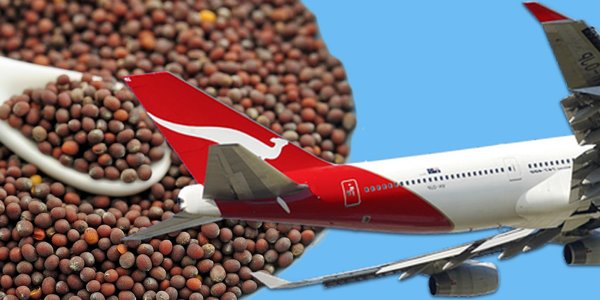First-Ever Biofuel Flight From US To Australia Is Powered By Mustard Seeds
![]()

By Amanda Froelich Truth Theory
Sustainability isn’t the future — it is now. On Tuesday, a Qantas plane became the first in the world to be partly powered by mustard seeds. After taking off from the United States, the aircraft landed in Melbourne, Australia in Tuesday.
The Guardian reports that the Boeing Dreamliner 787-9 used a blended fuel that was 10 percent derived from the brassica carinata, an industrial type of mustard seed that can function as a fallow crop. This reduced carbon emissions by 7 percent compared with the airline’s usual flight over the typical LA to Melbourne route. When compared pound for pound with jet fuel, the mustard seed biogas reduces emissions by 80 percent over the fuel’s entire life cycle.
“Almost within a day after harvesting, they can press the oil out in their own shed and use it straight into their tractors,” said Daniel Tan of the University of Sydney. The agriculture expert added that mustard seed can double as a valuable crops and a source of fuel for farmers who seek to cultivate crops in a more sustainable fashion.
“Basically it’s good for growing, and also farmers can also use it. If they grow wheat every year it’s not good for the soil. They can grow mustard seed in between the wheat crops, every second or third year, press the oil and use it locally or export it for use in aviation fuel,” added Tan.
“A lot of the biodiesel now being processed is actually from waste oil from places like fish and chip shops. A lot of these oils can be processed, but the problem is that they can’t get consistent supply. The big problem with the biodisel industry in Australia is mainly the continuity of supply.”
One hectare, or approximately 2.5 miles, can be used to produce an astonishing 400 liters of aviation fuel or 1,400 liters of renewable diesel, reports The Guardian.
This isn’t the first progressive move made by Qantas. In 2012, the airline partnered with Jetstar to trial Australia’s first domestic biofuel flights with a blend comprised of 50 percent cooking oil. It successfully flew from Sydney to Adelaide and from Melbourne to Hobart. By 2020, Qantas aims to use a renewable fuel for all Los Angeles-based flights, supplied by US company SG Preston. Qantas says the fuel does not necessarily need to be derived from mustard seeds.
In the near future, Qantas will set up an Australian biorefinery in partnership with Agrisoma BIosciences. The Canadian company extracted the carinate-derived fuel for this latest flight. According to a Qantas spokesperson, biofuel blends are capped at 50 percent. However, new specifications could permit 100 percent biofuel flights in the future.
In 2017, air travel accounted for 2.5% of all carbon dioxide emissions. By 2050, the total emissions are expected to quadruple. By relying on biofuels, airlines are helping to reduce carbon emissions and, as a result, air pollution.
What are your thoughts? Please comment below and share this news!
Leave Comment: